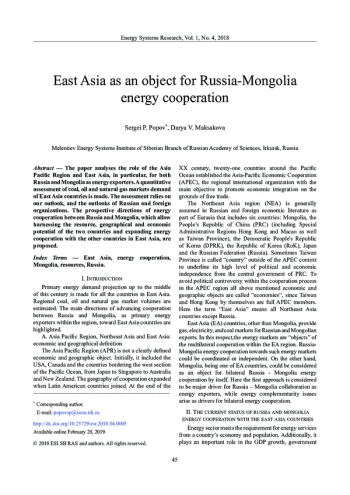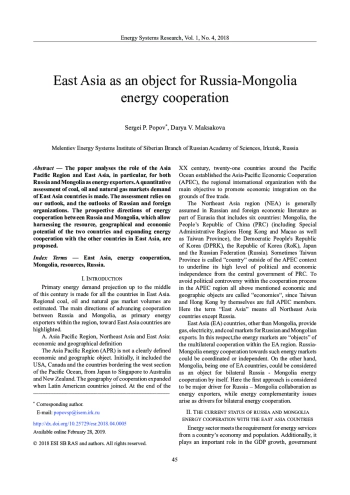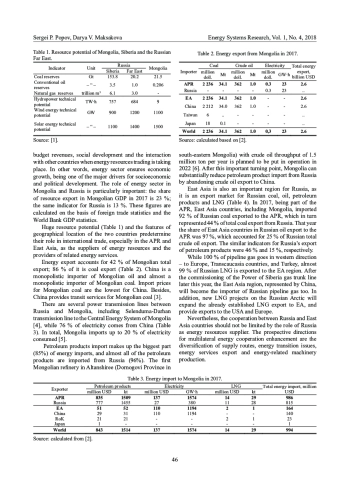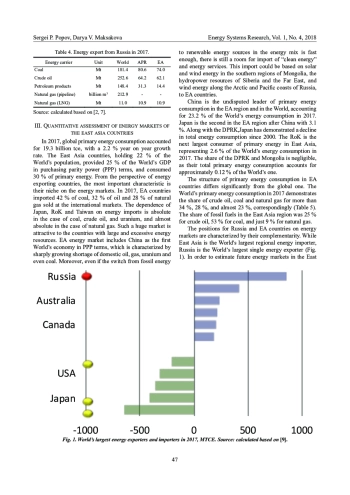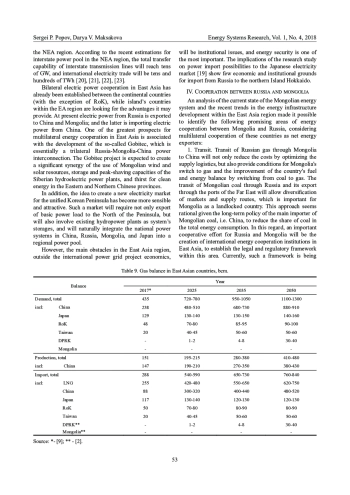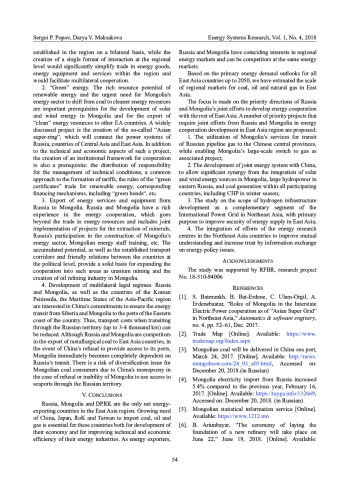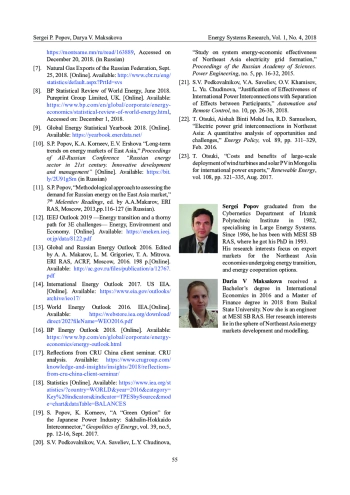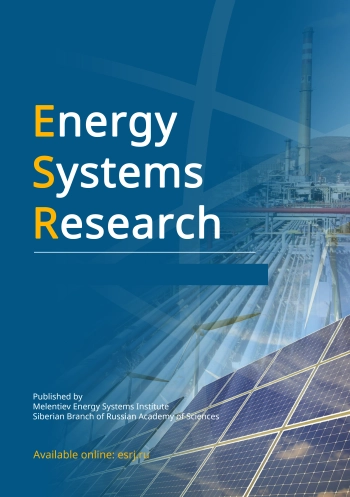The paper analyses the role of the Asia Pacific Region and East Asia, in particular, for both Russia and Mongolia as energy exporters. A quantitative assessment of coal, oil and natural gas markets demand of East Asia countries is made. The assessment relies on our outlook, and the outlooks of Russian and foreign organizations. The prospective directions of energy cooperation between Russia and Mongolia, which allow harnessing the resource, geographical and economic potential of the two countries and expanding energy cooperation with the other countries in East Asia, are proposed.
Идентификаторы и классификаторы
Primary energy demand projection up to the middle of this century is made for all the countries in East Asia. Regional coal, oil and natural gas market volumes are estimated. The main directions of advancing cooperation between Russia and Mongolia, as primary energy exporters within the region, toward East Asia countries are highlighted.
Список литературы
1. S. Batmunkh, B. Bat-Erdene, C. Ulam-Orgil, A. Erdenebaatar, “Roles of Mongolia in the Interstate Electric Power cooperation as of “Asian Super Grid” in Northeast Asia”, Automatics & software enginery, no. 4, pp. 52-61, Dec. 2017.
2. Trade Map [Online]. Available: https://www.trademap.org/Index.aspx.
3. Mongolian coal will be delivered in China sea port, March 24, 2017. [Online]. Available: http://news.mongolnow.com/24_03_ a03.html, Accessed on: December 20, 2018.(in Russian).
4. Mongolia electricity import from Russia increased 5.4% compared to the previous year, February 16, 2017. [Online]. Available: https://tayga.info/132669, Accessed on: December 20, 2018. (in Russian).
5. Mongolian statistical information service [Online]. Available: https://www.1212.mn.
6. B. Ariunbayar, “The ceremony of laying the foundation of a new refinery will take place on June 22”, June 19, 2018. [Online]. Available: https://montsame.mn/ru/read/163889, Accessed on December 20, 2018. (in Russian).
7. Natural Gas Exports of the Russian Federation, Sept. 25, 2018. [Online]. Available: http://www.cbr.ru/eng/statistics/default. aspx?PrtId=svs.
8. BP Statistical Review of World Energy, June 2018. Pureprint Group Limited, UK. [Online]. Available: https://www.bp.com/ en/global/corporate/energy-economics/statistical-review-of-world-energy.html, Accessed on: December 1, 2018.
9. Global Energy Statistical Yearbook 2018. [Online]. Available: https://yearbook.enerdata.net.
10. S.P. Popov, K.A. Korneev, E.V. Ershova “Long-term trends on energy markets of East Asia”, Proceedings of All-Russian Conference “Russian energy sector in 21st century. Innovative development and management” [Online]. Available: https://bit. ly/2U91gSm (in Russian). EDN: UWSZCH
11. S.P. Popov, “Methodological approach to assessing the demand for Russian energy on the East Asia market”, 7th Melentiev Readings, ed. by A.A.Makarov, ERI RAS, Moscow, 2013,pp.116-127 (in Russian).
12. IEEJ Outlook 2019 -Energy transition and a thorny path for 3E challenges- Energy, Environment and Economy. [Online]. Available: https://eneken.ieej.or.jp/data/8122.pdf.
13. Global and Russian Energy Outlook 2016. Edited by A. A. Makarov, L. M. Grigoriev, T. A. Mitrova. ERI RAS, ACRF, Moscow, 2016. 198 p.[Online]. Available: http://ac.gov.ru/files/publication/a/12767.pdf.
14. International Energy Outlook 2017. US EIA. [Online]. Available: https://www.eia.gov/outlooks/archive/ieo17.
15. World Energy Outlook 2016. IEA.[Online]. Available: https://webstore.iea.org/download/direct/202?fileName=WEO2016. pdf.
16. BP Energy Outlook 2018. [Online]. Available: https://www.bp.com/en/global/corporate/energy-economics/energy-outlook. html.
17. Reflections from CRU China client seminar. CRU analysis. Available: https://www.crugroup.com/ knowledge-and-insights/ insights/2018/reflections-from-cru-china-client-seminar.
18. Statistics [Online]. Available: https://www.iea.org/statistics/?country=WORLD&year=2016&category=Key%20 indicators&indicator=TPESbySource&mode=chart&dataTable=BALANCES.
19. S. Popov, K. Korneev, “A “Green Option” for the Japanese Power Industry: Sakhalin-Hokkaido Interconnector”, Geopolitics of Energy, vol. 39, no.5, pp. 12-16, Sept. 2017. EDN: XNKQYJ
20. S.V. Podkovalnikov, V.A. Saveliev, L.Y. Chudinova, “Study on system energy-economic effectiveness of Northeast Asia electricity grid formation”, Proceedings of the Russian Academy of Sciences. Power Engineering, no. 5, pp. 16-32, 2015. EDN: UXMEGT
21. S.V. Podkovalnikov, V.A. Saveliev, O.V. Khamisov, L. Yu. Chudinova, “Justification of Effectiveness of International Power Interconnections with Separation of Effects between Participants”, Automation and Remote Control, no. 10, pp. 26-38, 2018. EDN: PGZPMB
22. T. Otsuki, Aishah Binti Mohd Isa, R.D. Samuelson, “Electric power grid interconnections in Northeast Asia: A quantitative analysis of opportunities and challenges”, Energy Policy, vol. 89, pp. 311-329, Feb. 2016.
23. T. Otsuki, “Costs and benefits of large-scale deployment of wind turbines and solar PV in Mongolia for international power exports”, Renewable Energy, vol. 108, pp. 321-335, Aug. 2017.
Выпуск
Другие статьи выпуска
An increase in service life of equipment and plants (objects) in electric power systems makes it more appropriate to relate the organization of a system of maintenance service and restoration of wear and tear to their technical condition. This, in turn generates the need to quantitatively estimate the indices of their individual reliability. There can be no data on failures and defects of concrete objects, therefore, in practice we often calculate generalized reliability indices. An intuitive understanding of the varied significance of varieties of attributes is reflected by classifying statistical data for some varieties of attributes. For example, they can be classified according to voltage class, design, service life, etc. At the same time, the question on the appropriateness of the statistical data classification is not considered. Initial assumptions of known methods and criteria of checking if it is expedient to classify the statistical data on failures of the electric power system objects in most cases are unacceptable, since they are not relevant to this data set. We have developed a new method and an algorithm to assess the appropriateness of the statistical data classification. Their novelty lies in the application of a fiducial approach to estimation of critical values of a sample from a set of multivariate statistical data.
The paper presents an option for determination of phase loads in the primary distribution network using the results of state estimation of the secondary distribution network that are obtained by smart meter measurements installed at the load and generator nodes. The problem of state estimation in the secondary distribution network based on measurements of the active and reactive nodal powers and voltage magnitudes rather than by the Newton method traditionally used for this purpose is solved by a method of simple iterations. Efficiency of using the proposed approach for determination of phase loads of the primary distribution network for each hour of daily curve of nodal powers is illustrated by the example of a 32-node test network.
The paper focuses on the probabilistic evaluation of oil and gas resources with the models and methods of AHP/ANP analysis. The AHP/ANP models are shown to be the particular cases of finite Markov chains, i. e. discrete random processes with Markov property. An integrated method (Markov expert logical analysis (МELA)) is proposed. The method is based on the models, methods and algorithms of Markov chains theory. This basis will stimulate the progress in research on multi-criteria decision-making problems that arise in various spheres. The paper presents different methods using MELA to allow for the uncertainty of numeric and nonnumeric data on gas reserves as methods of transformation of expert estimations into the probability distributions. Typical logical schemes are proposed for multi-criteria comparison of analogous objects, to take account of possible errors in porosity evaluation and to estimate project life.
The paper places an emphasis on the fact that many publications on complex reliability assessment of electric power and fuel systems do not always substantiate the application of various methods. We address the “system”, “nodal”, and “estimation” approaches to assess the reliability of electric power systems, given reliable fuel supply to power plants. These approaches are accompanied by an analysis of their correspondence to the objectives and goals of the study, as well as an analysis of the validity of their application in terms of the obtained result accuracy, research time, complexity of search for and preparation of the input data and forms of their representation in a model. All the approaches were tested in case studies. The nodal and system approaches were tested on a conventional power system, while the estimation approach was tested on design diagrams of the gas and electric power systems of the Northwestern Federal District of the Russian Federation
The paper is concerned with the numerical simulation of the coal gasification process in an entrained flow of high-temperature air-steam mixture. Due to the high initial temperature and the process staging, it is possible to obtain an efficient gasification process. The study aims to examine the stationary conditions of staged gasification process by using a mathematical model based on one-dimensional heat and mass transfer equations with combined submodels to describe physicochemical transformations. The simulation makes it possible to determine the boundaries of the transition from the “single-stage” to the “two-stage” gasification conditions and identify the most promising ones.
The paper presents the background of creation and development of Mongolia’s electric power industry and its current state. Despite considerable energy resources, the country suffers from electric power shortage that is covered by electricity supplied from Russia and China. The expected considerable power consumption growth can be met by doubling generating capacities, enhancing electrical networks and by interconnecting the five existing electric power systems (EPSs) into an Integrated Power System (NPS) of Mongolia as a future component of the Northeast Asian Super Grid. To accomplish these tasks, we propose a number of conceptual structural and technological models for the development of Mongolian electric power systems that can form a basis for the future Integrated Power System of Mongolia.
The progressing distribution of the electricity supply necessitates redesigning the mechanism for providing ancillary services particularly by the distribution grid. Methods of voltage regulation and congestion management particularly have to satisfy new standards since, although the development of renewables is increasing the number of resources with an impact, these resources’ individual contribution is comparatively slight. Taking the state-of-the-art and the basic regulatory conditions in Germany as a point of departure, this paper analyzes the requirements for algorithms and communication systems that provide distributed support to distribution grid operation. A novel mathematical method that prevents voltage range deviations and feeder overloads based on sensitivities is presented and validated in simulations by a case study. An analysis of the communications systems for monitoring and control technologies for distributed energy resources, including the available communication channels, serves as the basis for an evaluation of the suitability of current control mechanisms in the future. The findings of a live field test in a real 110 kV distribution grid corroborate the necessity for coordinated grid support by distributed energy resources and demonstrate the limits of current methods.
Статистика статьи
Статистика просмотров за 2025 - 2026 год.
Издательство
- Издательство
- ИСЭМ СО РАН
- Регион
- Россия, Иркутск
- Почтовый адрес
- 664033, Иркутская область, г. Иркутск, ул. Лермонтова, д. 130.
- Юр. адрес
- 664033, Иркутская область, г. Иркутск, ул. Лермонтова, д. 130.
- ФИО
- Стенников Валерий Алексеевич (Руководитель)
- E-mail адрес
- info@isem.irk.ru
- Контактный телефон
- +7 (395) 2500646
- Сайт
- https:/isem.irk.ru
